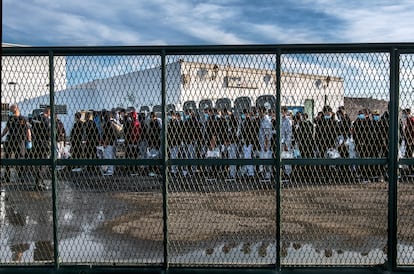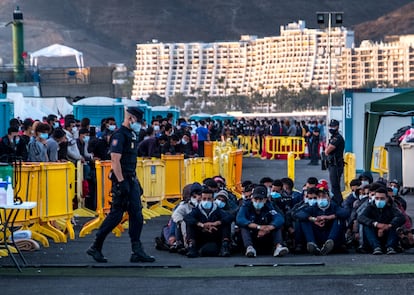In Spain’s Lanzarote island, political bickering keeps 400 migrants in cramped conditions
Police note people are being kept in an overcrowded facility with no showers even though there is a brand new €2.1 million center sitting empty nearby

Around 400 migrants, including several minors, are being held in overcrowded and insalubrious conditions in Lanzarote, in Spain’s Canary Islands, despite the fact that there is a brand new facility sitting empty nearby.
Hundreds of people have arrived by sea in the last three days. According to immigration legislation they must be held in police custody for up to 72 hours, but police sources said their facility in Lanzarote is not equipped for its current use; there are no showers, ventilation is poor and cockroaches come out at night, according to officers at the site. There are only five chemical toilets and one single tap with running water.
Meanwhile, a brand new €2.1 million facility built with European funds right behind the police station in Arrecife, in the port area, has been sitting empty since October. Local authorities refuse to open the camp, which was set up by Spain’s Interior Ministry, on the grounds that all the paperwork has not yet been completed and that the location is at risk of flooding by fecal waters in the event of heavy rains, according to a report by the civil protection agency. Mayor Astrid Pérez even warned that if central authorities went ahead and opened the center against the local council’s criteria, the whole facility would be taken apart.
Politics – in this case, a battle between local and central administrations – has gained the upper hand over logistical needs and over the dignity of immigrants.
“It is inexplicable that there is a place next to the police station, near the port where the migrant boats arrive, yet we have to keep people inside a warehouse full of vermin in the middle of a road,” said one police source. “It’s hard to understand what’s going on that’s keeping the camp from opening. The conditions in [the old facility] are deplorable. It’s a disaster.”

This is not the first time that the Canary Islands have come under fire for migrant holding conditions. The archipelago, located off the northwestern coast of Africa, has seen a sharp rise in boat landings in recent years – there were more than 23,000 in 2020, and for most months in 2021, arrivals doubled the previous year’s figures. Local authorities have often struggled to provide adequate care, particularly in 2020 when strict coronavirus containment rules compounded the difficulties.
A case that received widespread media attention was Arguineguín, on the island of Gran Canaria, where at one point there were over 2,500 migrants sleeping in emergency port facilities that were meant to hold no more than 600. This site was closed in November 2020 when the government embarked on a project to build several large camps in various parts of the Canaries.
The latest surge in arrivals newly underscores the larger issue of what to do with the migrants: politicians in the Canary Islands largely support sending them to mainland Spain, but the central government has argued that it would have a cascade effect, attracting even more people trying to reach Europe. Last year saw a flare-up of anti-immigration sentiment in the islands as authorities struggled to manage the crisis.
It is inexplicable that there is a place next to the police station, near the port where the migrant boats arrive, yet we have to keep people inside a warehouse full of vermin in the middle of a roadPolice officer in Arrecife, Lanzarote
The new holding center in Arrecife was created during a new spike in migrant arrivals in Lanzarote – there were over 4,800 in 2021. There was a logistical need for better facilities and the Interior Ministry did not see any major administrative hurdles in the way. The Port Authority had temporarily given the ministry permission to use a plot of land, and officials on both ends believed the camp could open immediately even if some of the bureaucratic procedures might take several months to be processed. Workers quickly set up modules containing toilets, showers, bedrooms and office space.
But Arrecife city officials complained that they had not been consulted and called the new center “illegal” and “undignified.” Interior Ministry sources said they now expect it will be at least three months before they are allowed to open it.
In the meantime, the police said they are working on a hybrid solution that involves physically taking some of the modules from the new center to the old facility, particularly the showers. As of Tuesday, it had yet to be done.
Bodies washed up on the shore
By Nacho Sánchez
The bodies of five immigrants have washed up on the shore of various beaches in Málaga province in the space of a week. The victims, three women and two men, were all young African adults. Spain’s National Police and Civil Guard are attempting to identify the bodies, and believe that the victims may have drowned in the western area of the Mediterranean Sea, where several migrant boats have capsized in recent weeks. Non-profit groups that work to help migrants had reported 17 people missing.
Tu suscripción se está usando en otro dispositivo
¿Quieres añadir otro usuario a tu suscripción?
Si continúas leyendo en este dispositivo, no se podrá leer en el otro.
FlechaTu suscripción se está usando en otro dispositivo y solo puedes acceder a EL PAÍS desde un dispositivo a la vez.
Si quieres compartir tu cuenta, cambia tu suscripción a la modalidad Premium, así podrás añadir otro usuario. Cada uno accederá con su propia cuenta de email, lo que os permitirá personalizar vuestra experiencia en EL PAÍS.
¿Tienes una suscripción de empresa? Accede aquí para contratar más cuentas.
En el caso de no saber quién está usando tu cuenta, te recomendamos cambiar tu contraseña aquí.
Si decides continuar compartiendo tu cuenta, este mensaje se mostrará en tu dispositivo y en el de la otra persona que está usando tu cuenta de forma indefinida, afectando a tu experiencia de lectura. Puedes consultar aquí los términos y condiciones de la suscripción digital.








































